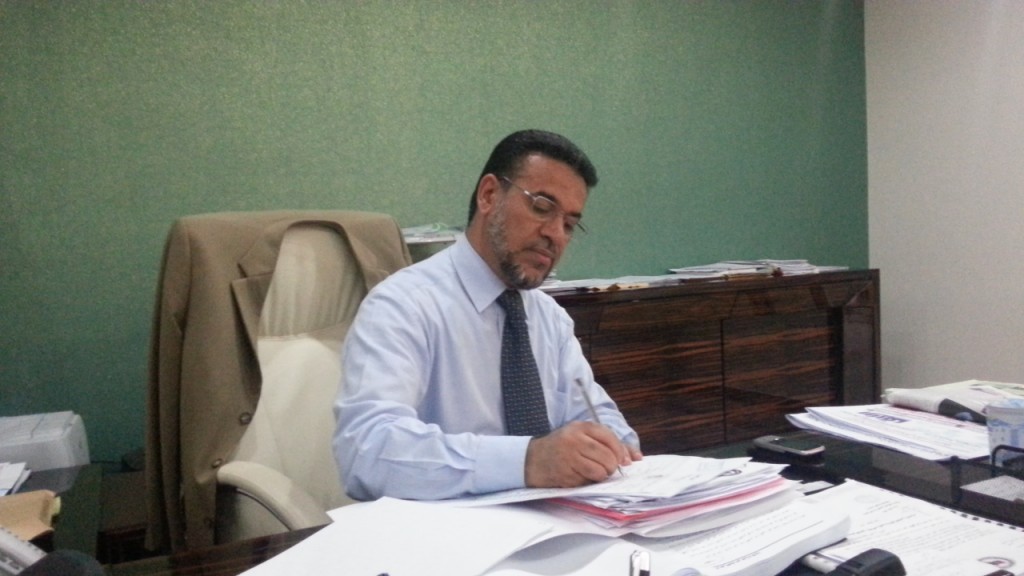By Umar Khan.
Tripoli, 27 July:

The local administration law approved by the NTC last month is now being reviewed by its legal . . .[restrict]department before it is published. The Minister of Local Government, Mohammed Hadi Hashemi Harari, told Libya Herald that he expects the law to be published very soon. “I’m in constant contact with the legal department and I hope the law will be published within days. At the same time our team of specialists is working on the bylaws.”
Asked if this law, which is being described by many as “the decentralisation law”, will serve that particular purpose, Harari says it most definitely will.
“This law will serve as the structure of the state. It will be the backbone. The bylaws will specify the roles of different institutions and will empower the regional offices as they’ll be able to take decisions about their own areas. It will lead to decentralization”, he said.
“The NTC did not give this law the importance it deserved. It should have been the priority because the lack of administration and weak government often lead to complications with the tribes and other forces, making use of the power vacuum, challenged the government’s writ”,
But things are different now. “I’m very hopeful that the new government won’t repeat the same mistake and will adopt the law at their earliest,” he added,
Harari is confident that the law, if done in the right spirit, can be fully implemented within two years. He said: “People have to realise that we have been working for ourselves for 42 years and now it’s time to work for Libya. It’s not about taking credit but serving Libya.” He continued: “Our team of specialists have worked hard to come up with the law, they’re now working on the bylaws that will serve as the regulations for the executives.”
The local administration law, when implemented, will see fresh elections for all the local councils that will also be re-structured based on the new law. Dr Mustafa Dabbash, professor of economy and a central member of the committee formed by the Minister Harari, who has been working on the local administration law, says that the existing councils are temporary and will only be operational till the law is implemented.
“There will be elections as soon as the law is implemented to elect the local representatives. The current local councils are temporary bodies that will be replaced by the new local administration system,” explained Dabbash.
He also added that the committee had ensured that they would legislate for a welfare state where all services were provided to the people as and when they needed them.
“We are working to finish the bylaws by the end of this month so they are ready to be used as soon as the law is implemented,” said Dabbash. He also noted that the committee had also prepared procedural charts to help administrators implement the law in the best possible way.
“We have prepared training material for the people carrying out different tasks to implement the system easily and effectively. It requires a good administrator to implement the law as they have to begin from the scratch. If done in the right way, one year should be enough to implement the law.”
Regarding decentralisation, Dabbash says, “It’s a matter of the order of procedure, the manuals are all there. In fact we have 27 manuals that can be used straightaway after a little modernisation. Decentralisation can be achieved very quickly and the local administration law already provides the foundation for it to be implemented in the fastest possible time.”
According to Dabbash, the delay in preparing the law was because there was no actual local administration law in place and the committee had to work on every aspect of the law from scratch.
It remains to be seen, though, whether the newly-elected National Congress will retain the NTC’s local administration law or come up with something completely different. It is responsible for approving the new constitution and with the debate focused on arguments about federalism and decentralisation, local administration is bound to be a key component of constitutional planning.
The first session of the congress is in less than two weeks’ time and it will shortly afterwards announce the new interim government to run the country till the general elections next year. It is widely believed that most ministers will be replaced but some who performed well are thought likely to be asked to stay on in the same role.
Asked if he would want to continue in the same position if asked by the congress, Harari was very clear that he would not decline any offer if given the chance to work in an independent manner. “I want to do things quickly for Libya as we have already wasted a lot of our time. If given the opportunity to work in the same position, I’ll gladly accept,” he said.
“Even if not, I’d still continue to work closely on the law with the next minister, as the only thing that matters is to serve Libya. Positions don’t matter.”
Umar Khan can be found on Twitter at www.twitter.com/umarnkhan
[/restrict]









